Are you tired of dealing with cracked and stained floors that are difficult to clean? Look no further, as epoxy resin flooring is a solution for all your flooring woes. In this article, we will explore the benefits and applications of epoxy resin flooring, helping you make an informed decision for your next flooring project.
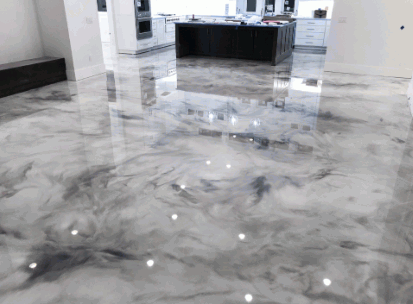
What Is Epoxy Resin Flooring?
Epoxy resin flooring is a highly durable and cost-effective solution that is perfect for industrial, commercial, and residential spaces. It provides a seamless, high-gloss finish that is resistant to chemicals and easy to clean. This type of flooring is created by combining a resin with a hardener, resulting in a strong plastic material that adheres well to most base layers.

How Is Epoxy Resin Flooring Made?
- Surface Preparation: Clean and prepare the substrate by grinding or shot blasting.
- Priming: Apply a primer to enhance adhesion.
- Mixing: Combine the epoxy resin with a hardener according to the manufacturer’s instructions.
- Application: Spread the mixture evenly on the prepared surface.
- Curing: Allow the epoxy to cure for the specified time.
A construction company transformed a dull warehouse with epoxy resin flooring, providing a seamless, durable, and aesthetically pleasing surface that withstood heavy machinery. To create this type of flooring, the process includes surface preparation, priming, mixing the epoxy resin with a hardener, application, and curing. This results in a strong and visually appealing surface that can withstand heavy machinery and other wear and tear.
Delve further: Is Resin Flooring Expensive
What Are The Benefits Of Epoxy Resin Flooring?
Epoxy resin flooring is a popular choice for industrial and commercial spaces due to its durability and versatility. In this section, we will discuss the various benefits of epoxy resin flooring, from its ability to withstand heavy foot traffic and chemical exposure to its easy maintenance and customizable design options. By understanding the advantages of this type of flooring, you can determine if it is the right choice for your space. Let’s dive into the specific benefits of epoxy resin flooring and how they can enhance your flooring experience.

1. Durability
- Opt for epoxy resin flooring for its exceptional durability, ability to withstand heavy foot traffic, and impact with ease.
- Prioritize proper surface preparation to enhance adhesion and strengthen the floor’s durability.
- Apply multiple layers of epoxy coating to further increase the flooring’s longevity and resistance to wear and tear.
A company saw significant improvements in its warehouse’s durability and maintenance costs after installing epoxy resin flooring.
2. Chemical Resistance
- Choose high-quality epoxy with superior chemical resistance to safeguard against corrosive substances.
- Ensure thorough surface preparation to promote strong adhesion and long-lasting results for your epoxy coating.
- Apply multiple layers of epoxy for increased chemical resistance and durability.
- Regularly inspect and maintain the flooring to promptly address any signs of wear or damage.
Pro-tip: Prioritize professional installation and periodic assessments to optimize the chemical resistance and lifespan of your epoxy resin flooring.
3. Easy To Clean And Maintain
- Regular Cleaning: Use a soft bristle broom or a dust mop to easily remove debris and dirt.
- Periodic Maintenance: Clean with a mild detergent and water to effortlessly remove stains and maintain the floor’s shine.
- Preventive Measures: Place doormats at entrances to minimize the accumulation of dirt and prevent scratches on the easy-to-clean and maintain epoxy resin flooring.
4. Versatility In Design And Color
Epoxy resin flooring provides versatility in both design and color, giving a vast array of possibilities for creating aesthetically pleasing floors. With the ability to incorporate different patterns, textures, and colors, unique flooring designs can be achieved.
The versatility of epoxy resin flooring allows for customization of spaces to cater to specific preferences and needs, from bold and vibrant hues to more subtle and muted tones.
What Are The Different Types Of Epoxy Resin Flooring?
Epoxy resin flooring is a popular choice for its durability and versatility in various settings. However, not all epoxy floors are created equal. In this section, we will discuss the different types of epoxy resin flooring available, including self-leveling epoxy floors, epoxy mortar floors, quartz-filled epoxy floors, and epoxy flake floors. By understanding the unique characteristics and uses of each type, you can determine which epoxy flooring is best suited for your specific needs.
1. Self-Leveling Epoxy Floors
- Prepare the surface: Clean and degrease the floor thoroughly.
- Prime the surface: Apply a primer to ensure proper adhesion.
- Mix the self-leveling epoxy: Follow the manufacturer’s instructions to prepare the mixture.
- Pour and spread: Pour the self-leveling epoxy onto the floor, and use a squeegee or roller to spread it evenly.
- Allow drying time: Let the self-leveling epoxy cure as per the manufacturer’s recommendations.
- Apply a topcoat: Protect the self-leveling epoxy floors with a topcoat for added durability.
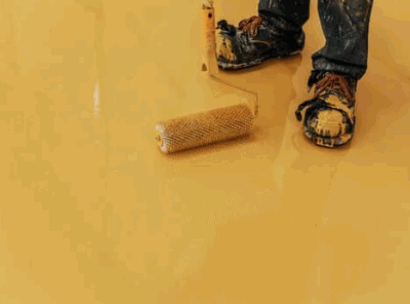
2. Epoxy Mortar Floors
- Preparation: Ensure the concrete substrate is properly prepared by shot blasting or grinding to achieve the correct surface profile.
- Priming: Apply a primer to the prepared substrate to promote adhesion and prepare for the installation of Epoxy Mortar Floors.
- Mixing: Combine the resin and hardener following the manufacturer’s instructions for Epoxy Mortar Floors.
- Application: Spread the epoxy mortar mix evenly over the prepared surface using a trowel for Epoxy Mortar Floors installation.
- Finishing: Allow the mortar to cure and then finish with a seal coat for additional protection of Epoxy Mortar Floors.

3. Quartz-Filled Epoxy Floors
- Prior to installation, it is important to thoroughly clean and repair any cracks or imperfections on the surface.
- Mix the epoxy resin with the quartz filler according to the specified instructions from the manufacturer.
- Using a trowel or squeegee, evenly apply the quartz-filled epoxy mixture onto the prepared surface.
- Allow the flooring to cure for the recommended amount of time before utilizing the area.
For a long-lasting and visually pleasing flooring solution, be sure to properly prepare the surface and follow all guidelines provided by the manufacturer when installing quartz-filled epoxy floors.
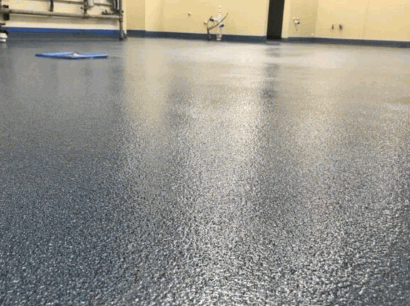
4. Epoxy Flake Floors
- Prepare the base: Make sure the concrete substrate is clean, dry, and free of any contaminants.
- Apply an epoxy primer: Use a roller or brush to evenly apply the primer over the floor.
- Spread the epoxy flake broadcast: Sprinkle the epoxy flakes evenly onto the epoxy base coat until the desired look is achieved.
- Seal the surface: Apply a clear topcoat to encapsulate the flakes and create a smooth, glossy finish.
For a stunning and long-lasting floor, consider incorporating Epoxy Flake Floors in high-traffic areas such as garages, commercial spaces, or even residential interiors.
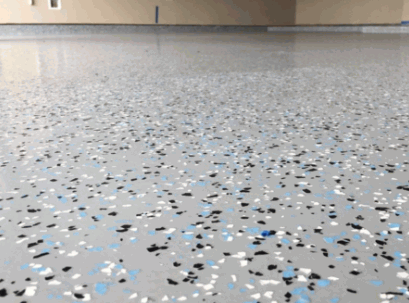
How Is Epoxy Resin Flooring Installed?
- Surface Preparation: Before installing epoxy resin flooring, make sure to thoroughly clean and dry the substrate.
- Priming: To enhance adhesion, apply a primer before installation.
- Mixing: Follow the manufacturer’s instructions for mixing the epoxy resin and hardener.
- Application: Evenly spread the epoxy resin mixture over the prepared surface.
- Curing: Allow the epoxy to cure for the specified time.
For a successful installation, proper ventilation is crucial and safety measures should be followed. It is recommended to consult a professional for large-scale projects.
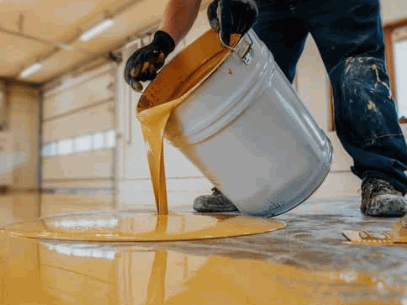
What Are The Potential Risks And Side Effects Of Epoxy Resin Flooring?
While epoxy resin flooring offers many benefits such as durability and low maintenance, it is important to also consider the potential risks and side effects that may come with its installation. In this section, we will dive into two key areas of concern: health risks from the installation process and the potential for a slippery surface. By understanding these risks, you can make an informed decision about whether epoxy resin flooring is the right choice for your home or business.
1. Health Risks From Installation Process
- Properly ventilate the installation area to minimize inhalation of fumes and reduce potential health risks.
- Wear personal protective equipment, such as respirators and gloves, to protect yourself during the installation process.
- Always follow the manufacturer’s guidelines for safe installation practices.
- Dispose of any installation waste properly to prevent environmental contamination.
Pro-tip: Before beginning the installation, thoroughly assess the work area for potential hazards and implement necessary safety measures to ensure a safe and healthy installation process.
2. Slippery Surface
- Before installation, make sure to properly prepare the surface.
- For added traction, think about incorporating anti-slip additives into the epoxy coating.
- To avoid the buildup of slippery substances, regularly clean the floor.
- Use caution signs in areas where there is a risk of slipping due to a slippery surface.
How To Maintain And Clean Epoxy Resin Flooring?
- To maintain and clean epoxy resin flooring, regularly sweep or dust mop the floor to remove dirt and debris.
- Use a soft-bristle broom or dust mop to clean the floor.
- For a deeper clean, wash the floor with a mild detergent or ammonia using a mop or soft-bristle brush.
- Rinse the floor thoroughly with clean water after cleaning.
- Be sure to regularly inspect for any damages or wear and tear and repair as needed.
Did you know? Epoxy resin flooring is highly resistant to chemicals and is commonly used in industrial and commercial settings.

What Are The Applications Of Epoxy Resin Flooring?
Epoxy resin flooring is a durable and versatile flooring option that has gained popularity in recent years. While it is commonly used in commercial and industrial settings, its applications extend beyond that. In this section, we will explore the various applications of epoxy resin flooring, including its use in commercial and industrial settings, residential spaces, and even for decorative purposes. By understanding these different applications, we can see the wide range of possibilities that epoxy resin flooring offers.
1. Commercial And Industrial Settings
- Surface Preparation: Clean and degrease the floor thoroughly.
- Priming: Apply a suitable primer to promote adhesion in commercial and industrial settings.
- Epoxy Application: Use a roller or brush to apply the epoxy resin coating in these settings.
- Curing: Allow the epoxy to cure for the specified time, ensuring optimal results and longevity in commercial and industrial settings.
- Top Coating: Apply a topcoat for added protection and durability, especially in commercial and industrial settings.
Consider consulting a professional for large-scale applications in these settings to ensure the best results and long-lasting effects.
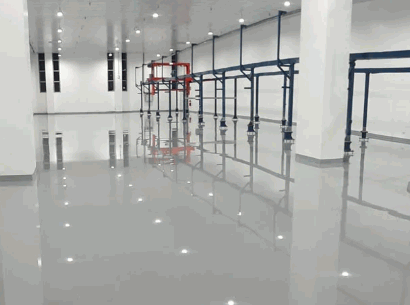
2. Residential Use
- Prepare the surface by ensuring it’s clean, dry, and free of any contaminants.
- Mix the epoxy resin and hardener according to the manufacturer’s instructions.
- Apply the epoxy resin mixture evenly using a roller or brush, starting from the furthest corner.
- Allow the first coat to dry completely before applying a second coat if necessary.
- Finish with a sealant to enhance durability and longevity for residential use.
Fact: Epoxy resin flooring can last for 20-30 years when properly maintained in residential settings.

3. Decorative Purposes
- Choose epoxy resin flooring for decorative purposes to elevate the aesthetic appeal of residential or commercial spaces.
- Consider using metallic epoxy coatings to achieve a luxurious and elegant look.
- Opt for 3D epoxy flooring to create stunning visual effects and designs, adding a unique touch to interiors.
Pro-tip: When using epoxy resin flooring for decorative purposes, make sure to properly prepare the surface for a flawless and long-lasting finish.







